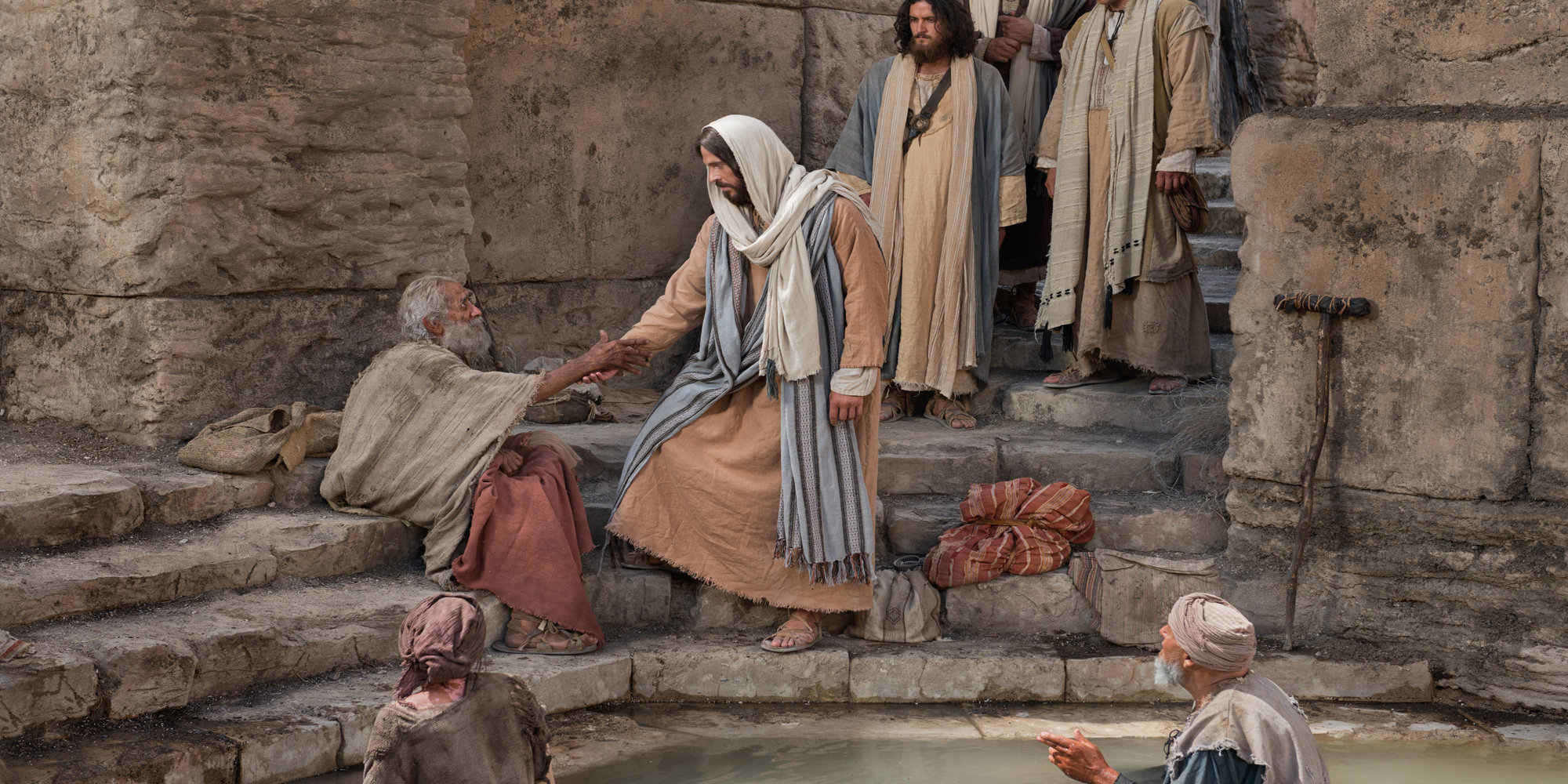Advocative
Most of the parables of Jesus have a judgment theme. He often said, “And there will be wailing and gnashing of teeth.” Given the urgency and the situation such startling warnings were necessary. They also brought credibility to His work. Consequences are an integral part of the natural world. Though many try to deceive themselves, people instinctively sense that there will be a day of reckoning. Our guilty natures only add to our sense of foreboding.
Our message to the world is also a startling warning. The three angel's messages contain the “the most fearful threatening ever addressed to mortals.”1 But like Christ's, our message must be that of an advocate. He came to show the world how much He loved them. Our fallen human natures do not easily sense this part of the God equation. Our guilt fills us with fear and condemnation. While it has to be done in a context of justice and even judgment, the real challenge is to present the love of Christ in an authentic, convincing manner.
“It is the darkness of misapprehension of God that is enshroud-ing the world. Men are losing their knowledge of His character. It has been misunderstood and misinterpreted. At this time the message from God is to be proclaimed, a message illuminating in its influence and saving in its power. His character is to be made known. Into the darkness of the world is to be shed the light of His glory, the light of His goodness, mercy and truth.”2
This was something that Jesus excelled at. “Christ’s method alone will give true success in reaching the people. The Savior mingled with men as one who desired their good. He showed His sympathy for them, ministered to their needs, and won their confidence. Then He bade them, 'Follow Me.'”3 Around Him there “were whole villages where there was not a moan of sickness in any house; for He had passed through them, and healed all their sick.”4
It is important to present an accurate picture of the relationship between justice and mercy as it pertains to the character of God and the process of atonement. To illustrate this, consider the vital distinction between Lucifer and Adam. “Lucifer in heaven had sinned in the light of God's glory. To him as to no other created being was given a revelation of God's love. Understanding the character of God, knowing His goodness, Satan chose to follow his own selfish will. This choice was final. There was nothing else that God could do to save him. But man was deceived; his mind was darkened by Satan's sophistry. The height and depth of the love of God he did not know. For him there was hope in a knowledge of God's love. By beholding His character he might be drawn back to God.”5
While justice allows forgiveness in cases of deception, it does not for fully informed, willful and persistent rebellion. “The wrath of God is not declared against unrepentant sinners merely because of the sins they have committed, but because, when called to repent, they choose to continue in resistance, repeating the sins of the past in defiance to the light given them.”6 “Through Jesus, God's mercy was manifested to men; but mercy does not set aside justice. The law reveals the attributes of God's character, and not one jot or tittle of it could be changed to meet man in his fallen condition.”7
But justice does allow for a limited period of safety from the law's retributive judgment—a sanctuary—in which the guilty are given time and means to reconnect with their loving Creator. “Infinite wisdom devised a plan of redemption, which places the race on a second probation by giving them another trial.”8 It is this period of safety that poses one of the greatest difficulties in the plan of salvation. It appears to set aside the strict demands of the law—potentially weakening its authority. After Calvary, “Satan declared that mercy destroyed justice, that the death of Christ abrogated the Father's law.”9 So provision had to be built into the atonement process in order to preserve the law's integrity.
“The transgression of God's law in a single instance, in the smallest particular, is sin. And the non-execution of the penalty of that sin would be a crime in the divine administration. God is a judge, the Avenger of justice… He cannot dispense with His law; He cannot do away with its smallest item in order to meet and pardon sin. The rectitude, justice, and moral excellence of the law must be main-tained before the heavenly universe and the worlds unfallen.”10
Christ's atoning life and death contained all the necessary provisions to preserve the law while also offering a second chance to sinners. Since “the law of God [is] the transcript of the divine character,”11 and since “the life of Christ on earth was a perfect expression of God's law,”12 it follows that Christ and the law are equal. So, “Christ alone could… make an offering equal to the demand of the law.”13 “Christ has made a sacrifice to satisfy the demands of justice… [the] holy law could not be maintained by any smaller price... [Instead] of the law being abolished to meet sinful man in his fallen condition, it has been maintained in all it's sacred dignity.”14
“Man's substitute and surety must have man's nature, a connection with the human family whom He was to represent, and, as God's ambassador, He must partake of the divine nature, have a connection with the Infinite, in order to manifest God to the world, and be a mediator between God and man. These qualifications were found alone in Christ. Clothing His divinity with humanity, He came to earth to be called the Son of man and the Son of God. He was the surety for man, the ambassador for God—the surety for man to satisfy by His righteousness in man's behalf the demands of the law, and the representative of God to make manifest His character to a fallen race.”15
Because of Christ's sacrifice, “the church is justified through Him, its representative and head... [The] Father ratifies the contract with His Son, that He will be reconciled to repentant and obedient men, and take them into divine favor through the merits of Christ. Christ guarantees that He will make man 'more precious than fine gold, even a man, than the golden wedge of Ophir.'”16
repentance and obedience to that law, and through obedience to acceptance with God. He would impute His righteousness to man and so raise him in moral value with God that his efforts to keep the divine law would be acceptable. Christ’s work was to reconcile man to God through His human nature, and God to man through His divine nature.”17
Christ's mission was to become a mediator between God and man. The apostle John calls Him our “advocate with the Father.”18 In the blend of His human and divine natures, He has been able to present the divine character in such a way as to draw humanity back. As disciples, we are also God's ambassadors. “The world has keenness of perception, and will take knowledge to some purpose of those who sit together in heavenly places in Christ Jesus. The character of God’s human agencies must be a transcript of the character of their Saviour.”19
Judgment is a looming reality and should strengthen our passion to advocate for those who know not the truth. This Galilee Protocol Directive is vitally important to the cause. We must be Advocative. “There is need of coming close to the people by personal effort. If less time were given to sermonizing, and more time were spent in personal ministry, greater results would be seen. The poor are to be relieved, the sick cared for, the sorrowing and the bereaved comforted, the ignorant instructed, the inexperienced counseled. We are to weep with those that weep, and rejoice with those that rejoice. Accompanied by the power of persuasion, the power of prayer, the power of the love of God, this work will not, cannot, be without fruit.20
“The love of a holy God is an amazing principle… But after the season of our probation, if we are found transgressors of God's law, the God of love will be found a minister of vengeance. God makes no compromise with sin. The disobedient will be punished. The wrath of God fell upon His beloved Son as Christ hung upon the cross of Calvary in the transgressors place. The love of God now reaches out to embrace the lowest, vilest sinner that will come to Christ with contrition. It reaches out to transform the sinner into an obedient, faithful child of God; but not a soul can be saved if he continues in sin.”21
1Ellen White, Great Controversy, p. 449. 2White, Christ's Object Lessons, p. 415. 3White, Ministry of Healing, p. 143. 4White, Desire of Ages, p. 241. 5White, Desire of Ages, p. 761-762. 6White, Acts of the Apostles, p. 62. 7White, Desire of Ages, p. 762. 8White, Testimonies, vol. 3, p. 484. 9White, Desire of Ages, p. 762. 10White, Manuscript 145, December 30, 1897, note of work. 11White, Ministry to the Cities, p. 30. 12White, Christ's Object Lessons, p. 315. 13White, Spirit of Prophecy, vol. 2, pp. 11-12. 14White, Manuscript Releases, vol. 21, p. 194. 15White, Selected Messages vol. 1, p. 257. 16White, Spirit of Prophecy, vol. 3, p. 203. 17White, Selected Messages, vol. 1, p. 272. 181 John 2:1. 19White, Medical Ministry, p. 46. 20White, Ministry of Healing, p. 143. 21White, Selected Messages, vol. 1, p. 313.




